新人教版|八年级下册英语所有知识点大汇总
- 格式:doc
- 大小:71.50 KB
- 文档页数:18
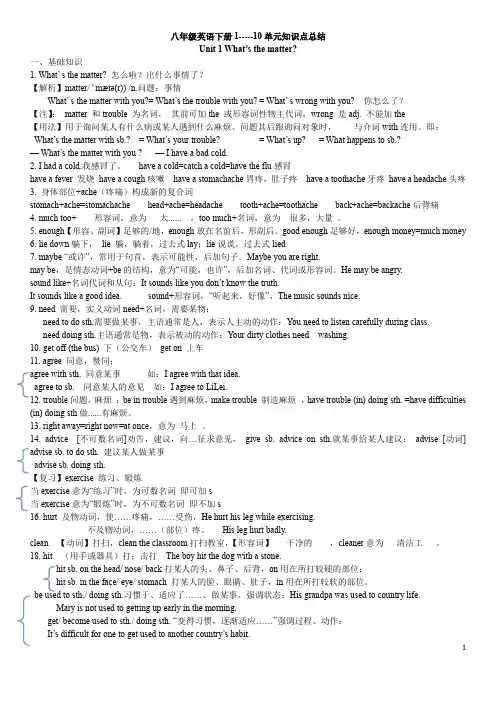
八年级英语下册1-----10单元知识点总结Unit 1 What’s the matter?一、基础知识1. What’ s the matter? 怎么啦?出什么事情了?【解析】matter/ ' mætə(r)) /n.问题;事情What’ s the matter with you?= What’s the trouble with you? = What’ s wrong with you? 你怎么了?【注】:matter 和trouble 为名词,其前可加the 或形容词性物主代词,wrong 是adj. 不能加the【用法】用于询问某人有什么病或某人遇到什么麻烦、问题其后跟询问对象时,与介词with连用。
即:What’s the matter with sb.? = What’s your trouble? = What’s up? = What happens to sb.?— What’s the matter with you ? — I have a bad cold.2. I had a cold.我感冒了。
have a cold=catch a cold=have the flu感冒have a fever 发烧have a cough咳嗽have a stomachache胃疼,肚子疼have a toothache牙疼have a headache头疼3. 身体部位+ache(疼痛)构成新的复合词stomach+ache=stomachache head+ache=headache tooth+ache=toothache back+ache=backache后背痛4. much too+ 形容词,意为太...... ,too much+名词,意为很多,大量。
5. enough【形容、副词】足够的/地,enough放在名前后,形副后。
good enough足够好,enough money=much money6. lie down躺下,lie 躺,躺着,过去式lay;lie说谎,过去式lied7. maybe “或许”,常用于句首,表示可能性,后加句子。
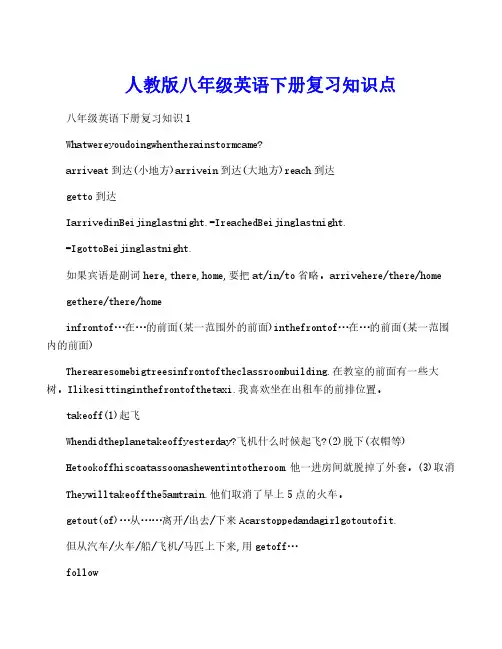
人教版八年级英语下册复习知识点八年级英语下册复习知识1Whatwereyoudoingwhentherainstormcame?arriveat到达(小地方)arrivein到达(大地方)reach到达getto到达IarrivedinBeijinglastnight.=IreachedBeijinglastnight.=IgottoBeijinglastnight.如果宾语是副词here,there,home,要把at/in/to省略。
arrivehere/there/homegethere/there/homeinfrontof…在…的前面(某一范围外的前面)inthefrontof…在…的前面(某一范围内的前面)Therearesomebigtreesinfrontoftheclassroombuilding.在教室的前面有一些大树。
Ilikesittinginthefrontofthetaxi.我喜欢坐在出租车的前排位置。
takeoff(1)起飞Whendidtheplanetakeoffyesterday?飞机什么时候起飞?(2)脱下(衣帽等)Hetookoffhiscoatassoonashewentintotheroom.他一进房间就脱掉了外套。
(3)取消Theywilltakeoffthe5amtrain.他们取消了早上5点的火车。
getout(of)…从……离开/出去/下来Acarstoppedandagirlgotoutofit.但从汽车/火车/船/飞机/马匹上下来,用getoff…follow跟随Ifollowedhimuphehill.我跟着他上了山.沿着……前进Followthisroaduntilyougettothepostoffice.顺着这条路一直到邮局.(3)听懂,理解Couldyouspeakmoreslowly?Ican’tfollowyou.你能说慢点吗?我听不(4)followsb.todosth.跟着某人做某事Pleasefollowmetoreadthestory.请跟我读这个。
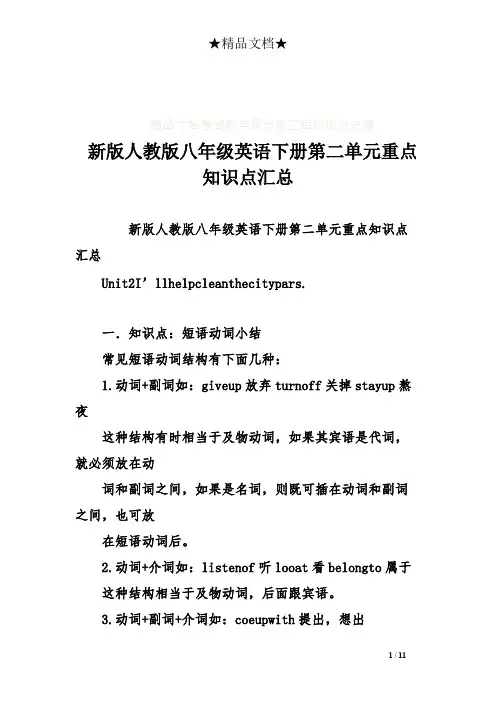
精品文档考试教学资料施工组织设计方案新版人教版八年级英语下册第二单元重点知识点汇总新版人教版八年级英语下册第二单元重点知识点汇总Unit2I’llhelpcleanthecitypars.一.知识点:短语动词小结常见短语动词结构有下面几种:1.动词+副词如:giveup放弃turnoff关掉stayup熬夜这种结构有时相当于及物动词,如果其宾语是代词,就必须放在动词和副词之间,如果是名词,则既可插在动词和副词之间,也可放在短语动词后。
2.动词+介词如:listenof听looat看belongto属于这种结构相当于及物动词,后面跟宾语。
3.动词+副词+介词如:coeupwith提出,想出runoutof用完,耗尽4.动词+名词(介词)如:taepartin参加catchholdof 抓住1.cheer(sb.)up使(某人)高兴、振作如:cheereup使我高兴cleanup打扫clean-upn.打扫2.hoelessadj.无家可归的ahoelessboy一个无家可归的男孩hoen.家4.sicadj.生病的作表语、定语illadj.生病的作表语,不能作定语5.volunteertodov.志愿效劳、主动贡献volunteern.志愿者6.coeupwith提出想出===thinup想出catchupwith赶上追上7.putoffdoing推迟做某事puton穿上(指过程)putup张贴8.writedown写下记下9.callup打电话aeatelephonecall打电话10.setup成立建立Thenewhospitalwassetupin2000.这座医院是在2000年成立的。
11.each每个各自的强调第一个人或事物的个别情况常与of连用every每个每一个的一切的则有“全体”的意思不能与of连用12.put…touse把…投入使用,利用Theyputthenewachinetouse.他们把新机器投入使用13.helpsb.(to)do帮助某人做某事helphi(to)study helpsb.withsth.帮助某人做某事helphiwithEnglish helpdo帮助做某事helpstudy14.plantodo计划做某事plan+从句IplantogotoBeijing.===Iplan(that)IwillgotoBeijing.我计划去北京。
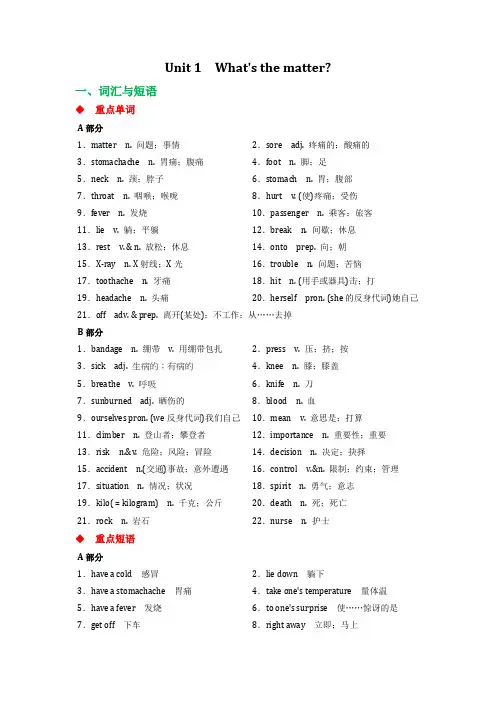
Unit 1 What's the matter?一、词汇与短语◆重点单词A部分1.matter n. 问题;事情2.sore adj. 疼痛的;酸痛的3.stomachache n. 胃痛;腹痛4.foot n. 脚;足5.neck n. 颈;脖子6.stomach n. 胃;腹部7.throat n. 咽喉;喉咙8.hurt v. (使)疼痛;受伤9.fever n. 发烧10.passenger n. 乘客;旅客11.lie v. 躺;平躺12.break n. 间歇;休息13.rest v. &n. 放松;休息14.onto prep. 向;朝15.X-ray n. X射线;X光16.trouble n. 问题;苦恼17.toothache n. 牙痛18.hit n. (用手或器具)击;打19.headache n. 头痛20.herself pron. (she的反身代词)她自己21.off adv. & prep. 离开(某处);不工作;从……去掉B部分1.bandage n. 绷带v. 用绷带包扎2.press v. 压;挤;按3.sick adj. 生病的;有病的4.knee n. 膝;膝盖5.breathe v. 呼吸6.knife n. 刀7.sunburned adj. 晒伤的8.blood n. 血9.ourselves pron. (we反身代词)我们自己10.mean v. 意思是;打算11.climber n. 登山者;攀登者12.importance n. 重要性;重要13.risk n.&v. 危险;风险;冒险14.decision n. 决定;抉择15.accident n.(交通)事故;意外遭遇16.control v.&n. 限制;约束;管理17.situation n. 情况;状况18.spirit n. 勇气;意志19.kilo( = kilogram) n. 千克;公斤20.death n. 死;死亡21.rock n. 岩石22.nurse n. 护士◆重点短语A部分1.have a cold 感冒2.lie down 躺下3.have a stomachache 胃痛4.take one's temperature 量体温5.have a fever 发烧6.to one's surprise 使……惊讶的是7.get off 下车8.right away 立即;马上9.take breaks (take a break) 休息10.talk too much 说得太多11.drink enough water 喝足够的水12.have a very sore throat 嗓子非常疼13.get an X-ray 拍X光片14.see a dentist 看牙医15.drink some hot tea with honey 喝一些加蜂蜜的热茶16.put some medicine on sth.在……上面敷一些药17.feel very hot 感到很热18.sound like 听起来像19.all weekend 整个周末20.in the same way 以同样的方式21.go to a doctor 看医生22.go along 沿着……走23.on the side of the road 在马路边24.shout for help 大声呼救25.without thinking twice 没有多想26.have a heart problem 有心脏病27.thanks to 多亏了;由于28.in time 及时29.save a life 挽救生命30.get into trouble 陷入麻烦31.hurt oneself 受伤32.fall down落下;摔倒B部分1.be used to 习惯于……;适应于……2.in a difficult situation 在困境中3.take risks (take a risk) 冒险4.keep on doing sth. 继续(或坚持)做某事5.run out (of) 用尽;耗尽6.make a decision 作出决定7.cut off 切除8.get hit on the head 撞到头部9.get out of 离开;从……岀来10.be interested in 对……感兴趣11.give up 放弃12.mean doing sth. 意味着做某事13.put a bandage on sth. 用绷带包扎…14.lose one's life 失去生命15.feel sick 感到恶心16.mountain climbing 登山运动17.have problems breathing 呼吸困难18.be in control of 掌管;管理◆重点句子A部分1.What's the matter with you?=What's the trouble with you?=What's wrong with you?你怎么了?2.What should she do? 她该怎么办呢?3.Did you fall down? 你跌倒了吗?4.Should I take my temperature? 我应该量一下体温吗?5.I think I sat in the same way for too long without moving.我想我以同样的姿势一动不动地坐得太久了。

最新人教版八年级英语下册第一单元知识点汇总Unit 1 What’s the matter?一、基础知识1.我感冒了。
可以表达为I had a cold、catch a cold或have the flu。
have a fever表示发烧,have a cough表示咳嗽,have a stomachache或肚子疼表示胃疼,have a toothache表示牙疼,have a headache表示头疼。
2.将身体部位和ache(疼痛)结合起来构成新的复合词,如stomach+ache=stomachache,head+ache=headache,tooth+ache=toothache,back+ache=backache,表示相应的疼痛。
3.“怎么啦?出什么事情了?”可以表达为What’ s the matter。
也可以用What’ s the trouble with you?或What’ s wrong with you。
matter和trouble为名词,其前可加the或形容词性物主代词,而wrong是形容词不能加the。
用于询问某人有什么病或遇到什么麻烦、问题,其后跟询问对象时,与介词with连用,如What’s the matter with sb。
= What’s your trouble?= What’s up?= What happens to sb。
举例来说,当问到“What’s the matter with you?”时,回答可以是“I have a bad cold.”4.maybe表示“或许”,常用于句首,表示可能性,后加句子。
例如Maybe you are right。
may be是情态动词+be的结构,意为“可能,也许”,后加名词、代词或形容词。
例如He maybe angry。
sound like可以和名词、代词以及从句结合使用,如It sounds like you don’t know the truth.It sounds like a good idea。
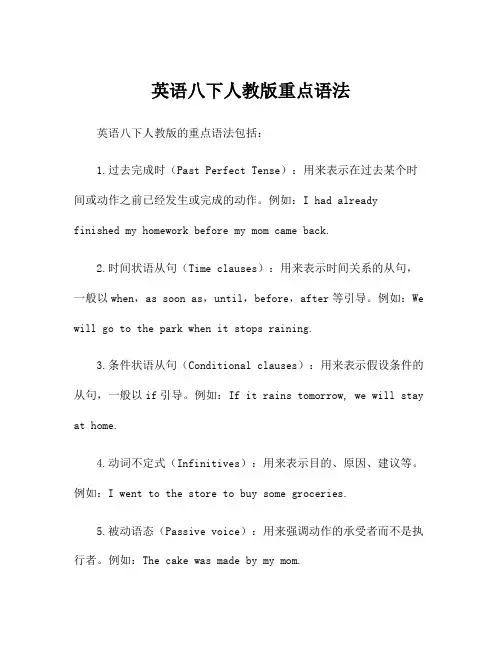
英语八下人教版重点语法
英语八下人教版的重点语法包括:
1.过去完成时(Past Perfect Tense):用来表示在过去某个时间或动作之前已经发生或完成的动作。
例如:I had already
finished my homework before my mom came back.
2.时间状语从句(Time clauses):用来表示时间关系的从句,一般以when,as soon as,until,before,after等引导。
例如:We will go to the park when it stops raining.
3.条件状语从句(Conditional clauses):用来表示假设条件的从句,一般以if引导。
例如:If it rains tomorrow, we will stay at home.
4.动词不定式(Infinitives):用来表示目的、原因、建议等。
例如:I went to the store to buy some groceries.
5.被动语态(Passive voice):用来强调动作的承受者而不是执行者。
例如:The cake was made by my mom.
6.定语从句(Relative clauses):用来修饰名词或代词的从句,一般由关系代词who,which,that引导。
例如:The boy who won
the competition is my neighbor.
这些语法结构在英语八下人教版教材中经常出现,需要学生掌握
和应用。
希望以上回答能对您有帮助。
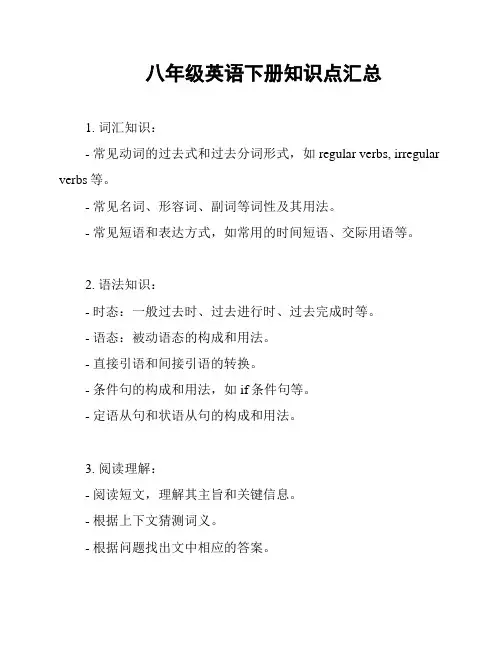
八年级英语下册知识点汇总
1. 词汇知识:
- 常见动词的过去式和过去分词形式,如regular verbs, irregular verbs等。
- 常见名词、形容词、副词等词性及其用法。
- 常见短语和表达方式,如常用的时间短语、交际用语等。
2. 语法知识:
- 时态:一般过去时、过去进行时、过去完成时等。
- 语态:被动语态的构成和用法。
- 直接引语和间接引语的转换。
- 条件句的构成和用法,如if条件句等。
- 定语从句和状语从句的构成和用法。
3. 阅读理解:
- 阅读短文,理解其主旨和关键信息。
- 根据上下文猜测词义。
- 根据问题找出文中相应的答案。
4. 写作技巧:
- 书面表达:写信、写作文等。
- 口头表达:进行简短的演讲、对话等。
- 语法和拼写的正确应用。
5. 听力技巧:
- 听取关键信息,如对话中的时间、地点、人物等。
- 根据对话内容回答问题。
- 培养对不同语速和语调的听力理解能力。
以上是八年级英语下册的主要知识点汇总,希望对你的学习有所帮助!。
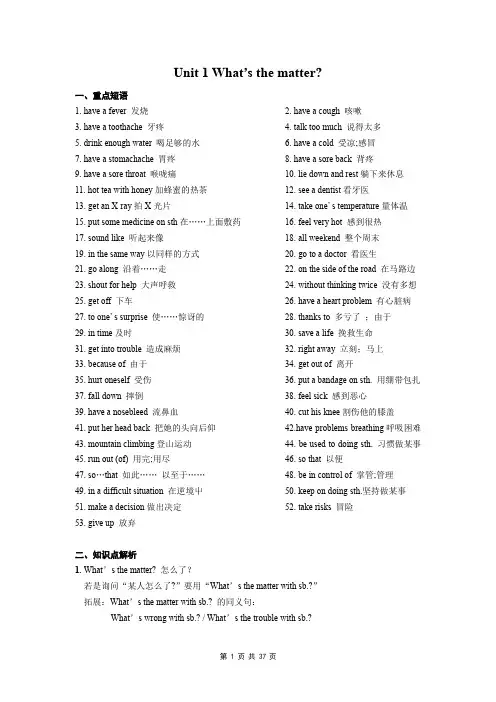
Unit 1 What’s the matter?一、重点短语1. have a fever 发烧2. have a cough 咳嗽3. have a toothache 牙疼4. talk too much 说得太多5. drink enough water 喝足够的水6. have a cold 受凉;感冒7. have a stomachache 胃疼8. have a sore back 背疼9. have a sore throat 喉咙痛10. lie down and rest躺下来休息11. hot tea with honey加蜂蜜的热茶12. see a dentist看牙医13. get an X-ray拍X光片14. take one’ s temperature量体温15. put some medicine on sth在……上面敷药16. feel very hot 感到很热17. sound like 听起来像18. all weekend 整个周末19. in the same way以同样的方式20. go to a doctor 看医生21. go along 沿着……走22. on the side of the road 在马路边23. shout for help 大声呼救24. without thinking twice 没有多想25. get off 下车26. have a heart problem 有心脏病27. to one’ s surprise 使……惊讶的28. thanks to 多亏了;由于29. in time及时30. save a life 挽救生命31. get into trouble 造成麻烦32. right away 立刻;马上33. because of 由于34. get out of 离开35. hurt oneself 受伤36. put a bandage on sth. 用绷带包扎37. fall down 摔倒38. feel sick 感到恶心39. have a nosebleed 流鼻血40. cut his knee割伤他的膝盖41. put her head back 把她的头向后仰42.have problems breathing呼吸困难43. mountain climbing登山运动44. be used to doing sth. 习惯做某事45. run out (of) 用完;用尽46. so that 以便47. so…that 如此……以至于……48. be in control of 掌管;管理49. in a difficult situation 在逆境屮50. keep on doing sth.坚持做某事51. make a decision做出决定52. take risks 冒险53. give up 放弃二、知识点解析1. What’s the matter? 怎么了?若是询问“某人怎么了?”要用“What’s the matter with sb.?”拓展:What’s the matter with sb.? 的同义句:What’s wrong with sb.? / What’s the trouble with sb.?2.疾病类短语:have a +疾病. e.g. :have a fever 发烧have a cold 感冒have a cough 咳嗽.have a +身体部位-ache. e.g.: have a headache 头痛have a toothache 牙痛.have a sore+身体部位. e.g.: have a sore throat咽喉痛have a sore back背痛例题:Mom, I____________.I’m sorry to hear that, dear. We must go to see the dentist right away.A. have a headacheB. have a stomachacheC. have a toothacheD. have a fever3. lie down 躺下V. 躺,平躺。
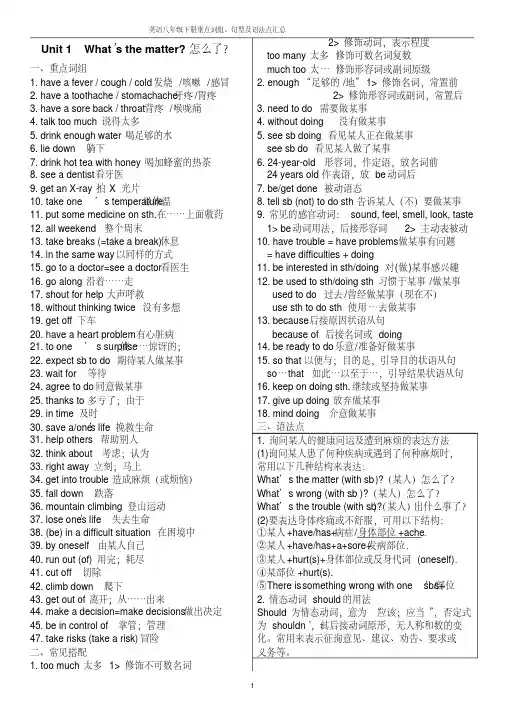
Unit 1 What’s the matter? 怎么了?一、重点词组1. have a fever / cough / cold 发烧/咳嗽/感冒2. have a toothache / stomachache 牙疼/胃疼3. have a sore back / throat 背疼/喉咙痛4. talk too much 说得太多5. drink enough water 喝足够的水6. lie down 躺下7. drink hot tea with honey 喝加蜂蜜的热茶8. see a dentist 看牙医9. get an X-ray 拍X 光片10. take one’s temperature量体温11. put some medicine on sth. 在……上面敷药12. all weekend 整个周末13. take breaks (=take a break) 休息14. in the same way 以同样的方式15. go to a doctor=see a doctor 看医生16. go along 沿着……走17. shout for help 大声呼救18. without thinking twice 没有多想19. get off 下车20. have a heart problem 有心脏病21. to one’ s surprise使……惊讶的;22. expect sb to do 期待某人做某事23. wait for 等待24. agree to do 同意做某事25. thanks to 多亏了;由于29. in time 及时30. save a/one’s life 挽救生命31. help others 帮助别人32. think about 考虑;认为33. right away 立刻;马上34. get into trouble 造成麻烦(或烦恼)35. fall down 跌落36. mountain climbing 登山运动37. lose one’s life 失去生命38. (be) in a difficult situation 在困境中39. by oneself 由某人自己40. run out (of) 用完;耗尽41. cut off 切除42. climb down 爬下43. get out of 离开;从……出来44. make a decision=make decisions 做出决定45. be in control of 掌管;管理47. take risks (take a risk) 冒险二、常见搭配1. too much 太多1> 修饰不可数名词2> 修饰动词,表示程度too many 太多修饰可数名词复数much too 太…修饰形容词或副词原级2. enough “足够的/地”1> 修饰名词,常置前2> 修饰形容词或副词,常置后3. need to do 需要做某事4. without doing 没有做某事5. see sb doing 看见某人正在做某事see sb do 看见某人做了某事6. 24-year-old 形容词,作定语,放名词前24 years old 作表语,放be动词后7. be/get done 被动语态8. tell sb (not) to do sth 告诉某人(不)要做某事9. 常见的感官动词:sound, feel, smell, look, taste 1> be动词用法,后接形容词2> 主动表被动10. have trouble = have problems 做某事有问题= have difficulties + doing11. be interested in sth/doing 对(做)某事感兴趣12. be used to sth/doing sth 习惯于某事/做某事used to do 过去/曾经做某事(现在不)use sth to do sth 使用…去做某事13. because 后接原因状语从句because of 后接名词或doing14. be ready to do 乐意/准备好做某事15. so that 以便与;目的是,引导目的状语从句so…that 如此…以至于…,引导结果状语从句16. keep on doing sth. 继续或坚持做某事17. give up doing 放弃做某事18. mind doing 介意做某事三、语法点1. 询问某人的健康问运及遭到麻烦的表达方法(1)询问某人患了何种疾病或遇到了何种麻烦时,常用以下几种结构来表达:What’s the matter (with sb.)?(某人)怎么了?What’s wrong (with sb.)?(某人)怎么了?What’s the trouble (with sb.)?(某人)出什么事了?(2)要表达身体疼痛或不舒服,可用以下结构:①某人+have/has+病症/身体部位+ache.②某人+have/has+a+sore+发病部位.③某人+hurt(s)+身体部位或反身代词(oneself).④某部位+hurt(s).⑤There is something wrong with one’s+sb/部位2. 情态动词should的用法Should为情态动词,意为“应该;应当”,否定式为shouldn’t,其后接动词原形,无人称和数的变化。
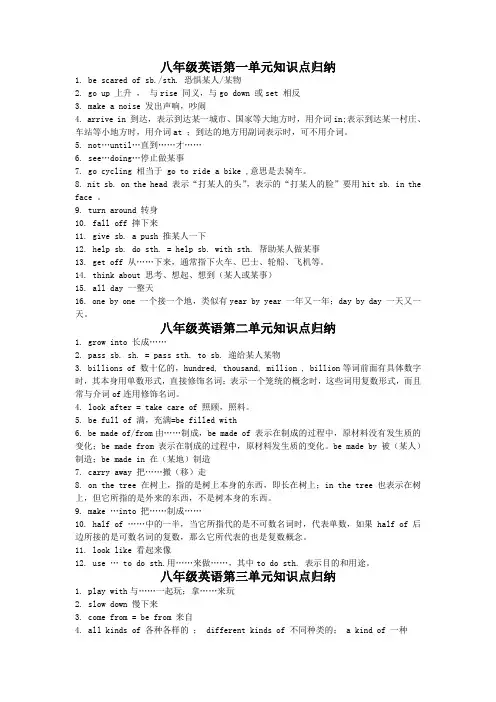
八年级英语第一单元知识点归纳1. be scared of sb./sth. 恐惧某人/某物2. go up 上升,与rise 同义,与go down 或set 相反3. make a noise 发出声响,吵闹4. arrive in 到达,表示到达某一城市、国家等大地方时,用介词in;表示到达某一村庄、车站等小地方时,用介词at ;到达的地方用副词表示时,可不用介词。
5. not…until…直到……才……6. see…doing…停止做某事7. go cycling 相当于 go to ride a bike ,意思是去骑车。
8. nit sb. on the head 表示“打某人的头”,表示的“打某人的脸”要用hit sb. in the face 。
9. turn around 转身10. fall off 摔下来11. give sb. a push 推某人一下12. help sb. do sth. = help sb. with sth. 帮助某人做某事13. get off 从……下来,通常指下火车、巴士、轮船、飞机等。
14. think about 思考、想起、想到(某人或某事)15. all day 一整天16. one by one 一个接一个地,类似有year by year 一年又一年;day by day 一天又一天。
八年级英语第二单元知识点归纳1. grow into 长成……2. pass sb. sh. = pass sth. to sb. 递给某人某物3. billions of 数十亿的,hundred, thousand, million , billion等词前面有具体数字时,其本身用单数形式,直接修饰名词;表示一个笼统的概念时,这些词用复数形式,而且常与介词of连用修饰名词。
4. look after = take care of 照顾,照料。
5. be full of 满,充满=be filled with6. be made of/from由……制成,be made of 表示在制成的过程中,原材料没有发生质的变化;be made from 表示在制成的过程中,原材料发生质的变化。
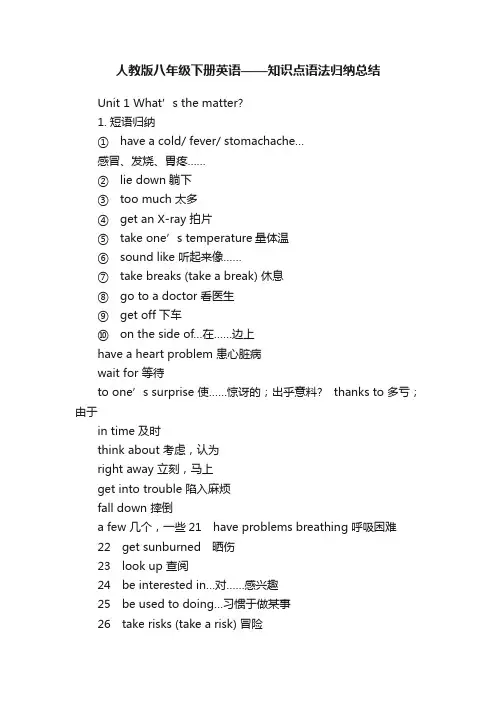
人教版八年级下册英语——知识点语法归纳总结Unit 1 What’s the matter?1. 短语归纳①have a cold/ fever/ stomachache…感冒、发烧、胃疼……②lie down 躺下③too much 太多④get an X-ray 拍片⑤take one’s temperature量体温⑥sound like 听起来像……⑦take breaks (take a break) 休息⑧go to a doctor 看医生⑨get off 下车⑩on the side of…在……边上have a heart problem 患心脏病wait for 等待to one’s surprise 使……惊讶的;出乎意料? thanks to 多亏;由于in time 及时think about 考虑,认为right away 立刻,马上get into trouble 陷入麻烦fall down 摔倒a few 几个,一些21 have problems breathing 呼吸困难22 get sunburned 晒伤23 look up 查阅24 be interested in…对……感兴趣25 be used to doing…习惯于做某事26 take risks (take a risk) 冒险27 lose one’s life 丧生28 became of 因为29 run out (of) 用尽,耗尽30 be ready to do sth. 准备做某事31 cut off 切除32 climb down 爬下33 get out of 离开;从……出来34 tell of 讲述35 the importance of (doing sth.) (做某事的)重要性36 be in control of 掌管,管理37 make a decision 做决定38 keep on doing sth. 坚持做某事39 give up 放弃40 cut/ hurt oneself 使自己受伤2. 典句必背①What’s the matter?②I have a stomachache.③What should I do?④Should I take my temperature?⑤I think you should lie down and rest.⑥If your head and neck still hurt tomorrow, then go to a doctor.⑦His love for mountain climbing is so great that he kept on climbing mountains even after this experience.3. 用法集萃(1) 当别人心情不好,身体不适或遇到麻烦时,我们可以用如下表达表示关心:What’s the matter?What’s the matter with you?What’s wrong with …?What’s the trouble\problem with …?(2) 英语中常用have描述身体的不适,此时have意为“患有”,常用结构:①have a + 疾病例:have a cold 感冒;have a fever 发烧;have a cough 咳嗽②have a + 身体部位-ache例:have a headache 头痛;have a toothache 牙痛③have a sore + 身体部位例:have a sore throat 咽喉痛;have a sore back 背痛(3) lie down躺下;tell lies/a lie 说谎含义过去式过去分词躺;平躺lay lain位于撒谎;说谎lied lied(4) maybe & may be①maybe,“或许”,常用于句首,表示可能性,后加句子。
新人教版|八年级下册英语所有知识点大汇总!Unit1 what' s the matter?1. It’s +形容词+ for sb。
+ to do sth. 做某事对某人来说是…的.It's important to do sth. 做某事很重要.It’s important for me to eat a balanced diet。
平衡饮食对我来说是很重要的。
It's easy to do sth。
做某事是容易的。
It’s easy for us to find out the answer. 找出答案对我们来说是容易的。
2. 情态动词should的用法should是情态动词,它的基本用法是必须和其他动词一起构成谓语。
意为"应该.。
..。
”。
should(应当,应该)用于所有人称,表示劝告或建议.eg。
——-I have a very bad cold。
我感冒很厉害。
-——You should lie down and have a rest。
你应该躺下,多喝水。
3。
maybe与may be(1)maybe是副词,译为“也许、可能”,相当于“perhaps”。
如:Maybe he can answer the question. 也许他能回答那个问题。
He maybe is from the USA, too. 他可能也来自美国.(2)may be中的may为情态动词,译为“可能是.。
...。
”。
如:He may be from the USA,too。
他可能也来自美国。
She may be our English teacher。
她可能是我们的英语老师。
4. few、a few、little、a little的区别和联系:(1)few / a few用来修饰可数名词,few表示否定意义,没有,几乎没有;a few表示肯定意义,有几个。
例如:He has few friends here,he feels lonely. 他这里没朋友,他感觉寂寞。
初二英语下册知识点总结人教版Unit 1Where's your pen pal from?知识点梳理:1.学习目标重点能够运用句型Where's your pen pal from?He/She's from… 进行交流,让学生能够初步了解及使用国家名称。
复习巩固本单元的国家名称,能够熟练朗读及拼写所学国家的名称。
2.句型-Where's your pen pal from? He's from Canada.-Is it a big city? Yes, it's a big city.3.单词Canada, Australia, Japan, pen pal, New York, London, Dublin, big, interesting, small 4.语言点Where's your pen pal from? He's from…Is it a big city? Yes, it's a big city.知识串记:1、Country and city英国 the UK 伦敦 London美国 the USA 纽约 New York加拿大 Canada澳大利亚 Australia爱尔兰 Ireland 都柏林 Dublin日本 Japan2、形容词比较级big huge small littleinteresting 更有趣的 boring 更无聊的good 好的 better 更好的3、句型Where is your pen pal from?他的笔友来自哪里?He/She is from…他/她来自……Is it a big city? 这是个大城市吗?Yes, it is. 是的,是个大城市。
No, it isn't.不,它不是。
Unit 2Where's the post office?知识点梳理:1.学习目标重点使学生通过Where’s the post office?等句型,初步了解并积累城市中的地理学习内容,对城市地理位置的认知。
人教版八年级下册英语必考知识点梳理(期末复习必备)八年级下册英语知识点Unit 1 What’s the matter?【重点短语】1.have a fever 发烧2.have a cough 咳嗽3.have a toothache 牙疼4.talk too much 说得太多5.drink enough water 喝足够的水6.have a cold 受凉;感冒7.have a stomachache 胃疼8.have a sore back 背疼9.have a sore throat 喉咙痛10. take risks 冒险11.hot tea with honey 加蜂蜜的热茶12.see a dentist 看牙医13.get an X-ray 拍X 光片14.take one’s temperature 量体温15.put some medicine on sth. 在……上面敷药16. give up 放弃17. sound like 听起来像18. all weekend 整个周末19. in the same way 以同样的方式20. go to a doctor 看医生21. go along 沿着……走22. on the side of the road 在马路边23. shout for help 大声呼救24. without thinking twice 没有多想25. get off 下车26. have a heart problem 有心脏病27. to one’s surprise 另某人惊讶的是28. thanks to 多亏了;由于29. in time 及时30. make a decision 做出决定31. get into trouble 造成麻烦32. right away 立刻;马上33. because of 由于34. get out of 离开;从……出来35. keep on doing sth. 继续或坚持做某事36. put a bandage on sth. 用绷带包扎37. fall down 摔倒38. feel sick 感到恶心39. have a nosebleed 流鼻血40. cut his knee 割伤他的膝盖41. put her head back 把她的头向后仰42. have problems breathing 呼吸困难43. mountain climbing 登山运动44. be used to doing sth. 习惯做某事45. run out (of) 用完;用尽46. so that 以便47. so...that... 如此……以至于...…48. be in control of 掌管;管理49. in a difficult situation 在闲境中【重点句型】1. What's the matter with you?= What'the trouble with you? = What's wrong with you? 你怎么了?2. What should she do? 她该怎么办呢?3.Should I take my temperature? 我应该量一下体温吗?4.You should lie down and rest. 你应该躺下休息一会儿。
最新⼈教版英语⼋年级下册期末复习各单元知识点总复习Unit 1 What’s the matter?⼀、重点短语1. have a (high) fever 发(⾼)烧2. have a cough 咳嗽3. have a toothache ⽛疼4. talk too much 说得太多5. drink enough water 喝⾜够的⽔6. have a (bad)cold (重)感冒7. have a stomachache 胃疼8. have a sore back 背疼9. have a very sore throat 喉咙⾮常痛10. lie down and rest 躺下来休息11. hot tea with honey 加蜂蜜的热茶12. see a dentist 看⽛医13. get an X-ray 拍X 光⽚14. take one’ s temperature 量体温15. put some medicine on sth. 伤⼝上敷药cut oneself 割伤某⼈⾃⼰16. feel very hot 感到很热have a headache 患头疼17. sound like 听起来像18. all weekend 整个周末19. in the same way以同样的⽅式take breaks 休息20. go to a doctor 看医⽣save an old man 拯救⼀位⽼⼈21. go along 沿着……22. on the side of the road 在马路边23. shout for help ⼤声呼救24. without thinking twice 没有多想25. get off 下车26. have a heart problem 有⼼脏病27. to one’ s surprise 使.......惊讶的28. thanks to 多亏了;由于29. in time 及时30. save a life 挽救⽣命hit an old man 撞了⼀位⽼⼈31. get into trouble 造成⿇烦32. right away ⽴刻;马上33. Because of+n.\pron. 由于…34. get out of 离开;从……出萍35. hurt oneself 受伤fall down 摔倒36. put a bandage on sth. ⽤绷带包扎37. run it under water 在⽔流下冲洗38. feel sick 感到恶⼼39. have a nosebleed 流⿐⾎40. cut his knee 割伤他的膝盖41. put her head back 把她的头向后仰hurt his back 伤到了后背rest for a few days 休息⼏天get hit on the head 头部挨打42. have problems breathing 呼吸困难get hit by a ball 被球击get sunburned 晒伤43. mountain climbing 登⼭运动44. be used to doing sth. 习惯做某事be used to taking risks 习惯于冒险45. run out (of) ⽤完;⽤46. so that 以便47. so. . . that 如此… …以⾄于…48. be in control of 掌管;管理49. in a difficult situation 在闲境⼬lose one’s life 丧命cut off half his right arm 切除半边右臂bandage himself 给他⾃⼰包扎50. keep on doing sth. 继续或坚持做某事51. make a decision 做出决定the importance of making decision做决定的重要性52. take risks 冒险go mountain climbing 去爬⼭53. give up 放弃have a serious accident 遇到严重的意外54. talk about health problems谈论健康问题55. give advice 提建议⼆、重点句型1. What’ s the matter?What’ s the matter(with you)?= What’s the trouble (with you)?= What’ s wrong with you?你怎么了?I have a stomachache. 我肚⼦疼。
八年级英语下册语法知识复习1.should 情态动词,应该,应当,用于询问,提出建议,或表达职责和义务。
如:What should I do? You should have a talk with your parents。
could 也可以提出建议,比较委婉.如: You could write him a letter。
could还用于礼貌地请求,如:Could you please clean your room? 否定句式:Could you please not do sth?其他常用情态动词:must必须,have to必须,不得不,may可能,可以,can能,会,可能,可以need需要。
情态动词+动词原形作谓语。
2.非谓语动词形式(一)动词不定式结构:to+动词原形或不带to。
否定:not+to do或not do句法功能:1)主语:常用it作形式主语,不定式为真正的主语:It is +形容词+for sb。
to do sth.It is important to keep fit。
=To keep fit is important.2)宾语:(1)直接宾语:想,喜欢,希望:want,like, love,would like,hope, expect;决定同意拒绝开始学习:decide,agree, refuse, begin,start, learn, 需要计划帮助提供:need, plan,help,offer+ to do(划线的动词还可以接doing)如:I’ll help to clean up the city parks。
(宾语)疑问词(what, who, which,where, when ,how,)+to do 作宾语I don’t know what to say. 我不知道说什么。
(2)宾补:tell,ask,want,wish,allow,invite,help,encourage,teach等+ sb. to do (hope不能接sb。
人教版初中英语八年级下册全册各单元知识点、语法归纳整理Unit1W hat’s the matter?一.重点短语归纳1.foot---feet脚tooth---teeth牙齿2.have a cold感冒3.have a stomachache胃疼4.have a sore back背疼5.have a sore throat喉咙疼6.have a fever发烧7.lie down and(have a)rest躺下休息have a rest休息8.hot tea with honey加蜜的热茶9.see a dentist看牙医see a doctor看医生10.drink lots of water多喝水11.lots of ,a lot of,许多。
大量a lota lot of=lots of,可以修饰可数名词复数和不可数名词,一般用在肯定句中。
:There are lots of(a lot of)books in our library.There is a lot of water on the grounda lot,是一个副词词组,跟动词连用;表示十分,很等意思;Thanks a lot.12.have a toothache牙疼13.That’s a good idea好主意14.go to bed去睡觉go to bed early早上床睡觉15.feel well感到好 feel ill感到不舒服I don’t feel well=I’m not feeling well我感觉不舒服.16.start doing/to do sth开始做某事to do是一件事情完成了,开始做另外一件事情doing是原来的那件事情做到一半,现在又开始做了,是同一件事情。
17.two days ago两天前18.get some rest多休息,休息一会儿19.I think so我认为是这样20.be thirsty口渴21.be hungry饥饿22.be stressed out紧张23.listen to music听音乐24.healthy lifestyle健康的生活方式25.traditional Chinese doctors传统中医26.need to do sth需要做某事I have a toothache.I need to see a dentist.我牙痛,我需要去看牙医.We need to keep our classroom clean.我们需要保持教室的干净.27.too much+不可数名词太多的…much too+形/副实在太…极其,非常too many+可数名词复数太多的…28.be good for sth./doing sth.对什么有益,对什么有好处be bad for sth./doing sth.对什么有害be good to对…好be good at=do well in在……方面好,擅长be good(bad) for、be good at的相关用法1.be good for对......有益Doing morning exercises is good for your health.做早操对你们的建康有益。
新人教版|八年级下册英语所有知识点大汇总!Unit1 what' s the matter?1. It’s +形容词+ for sb. + to do sth. 做某事对某人来说是…的。
It’s important to do sth. 做某事很重要。
It’s important for me to eat a balanced diet. 平衡饮食对我来说是很重要的.It’s easy to do sth. 做某事是容易的。
It’s easy for us to find out the answer. 找出答案对我们来说是容易的。
2. 情态动词should的用法should是情态动词,它的基本用法是必须和其他动词一起构成谓语。
意为"应该......"。
should(应当,应该)用于所有人称,表示劝告或建议。
eg. ---I have a very bad cold. 我感冒很厉害。
---You should lie down and have a rest. 你应该躺下,多喝水。
3. maybe与may be(1)maybe是副词,译为“也许、可能”,相当于“perhaps”。
如:Maybe he can answer the question. 也许他能回答那个问题。
He maybe is from the USA, too. 他可能也来自美国。
(2)may be中的may为情态动词,译为“可能是......”。
如:He may be from the USA, too. 他可能也来自美国。
She may be our English teacher. 她可能是我们的英语老师。
4. few、a few、little、a little的区别和联系:(1)few / a few用来修饰可数名词,few表示否定意义,没有,几乎没有;a few表示肯定意义,有几个。
例如:He has few friends here, he feels lonely. 他这里没朋友,他感觉寂寞。
There are a few eggs in the basket. 篮子里有几个鸡蛋。
(2)little / a little用来修饰不可数名词,little表示否定意义,没有,几乎没有;a little 表示肯定意义,有一点儿。
例如:There is little ink in my bottle. Can you give me a little ink? 我的瓶子里没有墨水了,你能给我点儿墨水吗?5. not…until 直到…(否定句) 才......,动词为短暂性或瞬间性动词。
She didn’t leave until we came.He went shopping after he got up.=He didn’t go shopping until /before he got up....until/till 直到......(肯定句)动词为延续性动词We stayed here till/until 12 o’clock.Unit2 I'll help clean the city parks.1. 短语动词小结常见动词短语结构有下面几种:(1)动词+副词如:give up 放弃;turn off 关掉;stay up 熬夜这种结构有时相当于及物动词,如果其宾语是代词,就必须放在动词和副词之间,如果是名词,则既可插在动词和副词之间,也可放在短语动词后。
(2)动词+介词如:listen of 听;look at 看;belong to 属于这种结构相当于及物动词,后面跟宾语。
(3)动词+副词+介词如:come up with 提出,想出;run out of 用完,耗尽(4)动词+名词+介词如:take part in参加;catch hold of 抓住2. each 每个,各自的,强调事物的个别情况,常与of 连用every 每个,每一个的,一切的,有“全体”的意思不能与of 连用3. help sb. (to) do 帮助某人做某事help him (to) studyhelp sb. with sth. 帮助某人做某事help him with Englishhelp do 帮助做某事help study4. spend...doing... 花费…做…I spent a day visiting Beijing. 我花了一天的时间去参观北京。
spend…on sth. 花费…在…I spent 3 years on English.5. join 参加(指参加团体、组织) 如:join the Party 入党take part in 参加(指参加活动) 如:take part in sports meeting 参加运动会6. run out 与run out of(1)run out (become used up). 其主语往往为物。
如时间,食物,金钱,油等,本身就含有被动意义。
His money soon ran out. 他的钱很快就花光了。
Our time is running out. 我们剩下的时间不多了。
(2)run out of 主语为人,表示主动含义。
He is always running out of money before pay day. 他总是在发工资的日子还没有到就把钱花完了。
两者在一定条件下可以互换如:The petrol is running out. 汽油快用完了= We are running out of petrol.Our time is running out. 我们剩下的时间不多了。
= We are running out of time.7. work out(1)结局,结果为The strategies that he came up with worked out fine. 他提出的这个策略效果很好。
(2)算出,制订出,消耗完(精力等)He never seems to be worked out. 他好像永远不会疲乏似的。
He worked out a plan. 他制订了一个计划。
I have worked out our total expenses. 我已经算出了我们总的费用。
8. hang out 闲荡闲逛I like to hang out at mall with my friends. 我喜欢和我的朋友一起去购物中心闲荡。
9. be able to do 能,会be unable to do 不能,不会10. for sure 确实如此,毫无疑问You don’t have money. That’s for sure. 你没有钱,这是毫无疑问的。
11. fill…with…使…充满…用…填充…She filled the bowl with water. 她用水填满碗。
12. hand out 分发hand out bananasgive out 分发give out sth to sb. 分….给某人give up doing 放弃…give up smoking 放弃吸烟give away 赠送捐赠give away money to kidsgive sb. sth. 给某人某东西give me money 给我钱give sth. to sb. 给某人某东西give money to me 给我线13. help sb. out 帮助…做事,解决难题(摆脱困境)I can’t work out this math problem. Please help me out. 我不能算出这道数学问题,请你帮我解决。
14. train n. 火车v. 训练train sb. to do. 训练某人做某事She trains her dog to fetch things. 她训练她的狗去取东西。
15. at once == right away 立刻马上如:Do it at once. 马上去做。
I’ll go there at once/ right away. 我马上去那里。
16. one day 有一天(指将来/过去)some day 有一天(指将来) 如:One day I went to Beijing. 有一天我去了北京。
Some day I’ll go to Beijing. 有一天我将去北京。
Unit3 Could you please clean your room?1. 关于to 的短语总结have to do sth. 不得不/必须做某事need to do sth. 需要做某事hate to do sth. 讨厌做某事like to do sth. 喜欢做某事want to do sth. 想做某事love to do sth. 热爱做某事forget to do sth. 忘记做某事start to do sth. 开始做某事begin to do sth. 开始做某事ask sb to do sth. 请某人做某事2. ---Could you please clean your room?---Yes, sure. / Sorry, I can't. I have to do my homework first.---Could I please use the car?---Sure. / Certainly. / Of course. / No, you can't. I have to go out.在表示请求帮助或请求允许的疑问句中,常用could 代替can,以表示礼貌,委婉或不确定的语气,而can 则不具备这些语气。
这种情况下不能把could 看作can 的过去式。
以上两句中用could 是为了表示礼貌的请求。
表示请求帮助或请求允许时,除了can, could 之外,还可以用may,句子的表达方式也各有不同,可以用不同的方式来表示同一个概念。
例:Could / Can / May I use your car for a day?作允答可以各种各样:如同意可以说Yes,或Sure 或Certainly,还可说Yes, (do) please.或Of course. (you may / can). 或That's OK / all right.如果不同意,可以说I'm sorry you can't. 或I'm really sorry, but I have to use it today. 要避免说No, you can't. 这样显得很不礼貌。